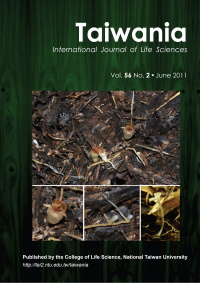Research Paper
Glossogyne Tenuifolia Enhances Posttranslational S-Nitrosylation of Proteins in Vascular Endothelial Cells
Chao-Ping Wang, Jer-Yiing Houng, Hsia-Fen Hsu, Han-Jung Chen, Bin Huang, Wei-Chin Hung, Teng-Hung Yu, Cheng-An Chiu, Li-Fen Lu and Chia-Chang Hsu
Published on: 15 June 2011
Page: 97 - 104
DOI: 10.6165/tai.2011.56(2).97
Abstract
Glossogyne tenuifolia (GT) is a traditional Chinese herb that possesses strong antioxidant activity and protects against endothelial cell (EC) injury by inhibition of free reactive oxygen species (ROS). The aim of this study was to elucidate the mechanisms by which GT prevents endothelial injury using a proteomics approach. We used a sensitive method to analyze the S- nitrosoproteins utilizing a modified biotin-switch method in order to detect the possible effects of GT on protein posttranslational modification. After treatment of vascular ECs with GT, two proteins HspA9 (IS1), beta-actin (IS2) were observed to have increased posttranslational S-nitrosylation, whereas seven proteins, vimentin (DS2, DS3 and DS5), tropomyosin 3, 4 (DS6 and DS7) and oxidative phosphorylation protein such as ATP synthase, F1 complex (DS1) and 80K-H protein (DS4), were found to have decreased posttranslational S-nitrosylation. Due to S-nitrosylation of HspA9 causing the reduction of intracellular ROS and S-nitrosylation of ATP synthase interfering with ATP production and ROS formation, our study may indicate a novel mechanism in which GT protects EC injury by the inhibition of oxidative reaction.
中文摘要
香茹草(Glossogyne tenuifolia)是一種天然傳統藥草且已經被報導藉由抑制細胞中自由基活性氧分子(free reactive oxygen species, ROS)來達到抗氧化及保護血管內皮細胞之作用。本研究之目的為藉由蛋白質體學來探討香茹草保護內皮細胞之機轉。藉由modified biotin-switch之實驗方法來分析蛋白質之硝酸化情形,以此方法來偵測香茹草在蛋白質經轉譯後硝酸化上所帶來的反應與作用。實驗結果發現,經香茹草萃取物作用後的血管內皮細胞,其中HspA9 (IS1)與beta-actin (IS2)此2種轉譯後硝酸化蛋白質有提昇的現象;vimentin (DS2、DS3 及 DS5)、tropomyosin 3, 4 (DS6 及 DS7)與oxidative phosphorylation protein(如ATP synthase, F1 complex (DS1)與80K-H protein (DS4))等7種轉譯後硝酸化蛋白質則受到抑制。由於HspA9經轉譯後硝酸化可能減少血管內皮細胞ROS,且ATP synthase經轉譯後硝酸化可能干擾ATP的產生及ROS的形成,因此本研究結果指出香茹具有保護內皮細胞損傷之另一新的機轉,可能是藉由抑制細胞中氧化物質的形成所引發。
Keyword: Antioxidation, free reactive oxygen species, Glossogyne tenuifolia, posttranslational S-nitrosylation of proteins, vascular endothelial cells. 抗氧化、自由基活性氧分子、香茹草、轉譯後硝酸化、血管內皮細胞。


